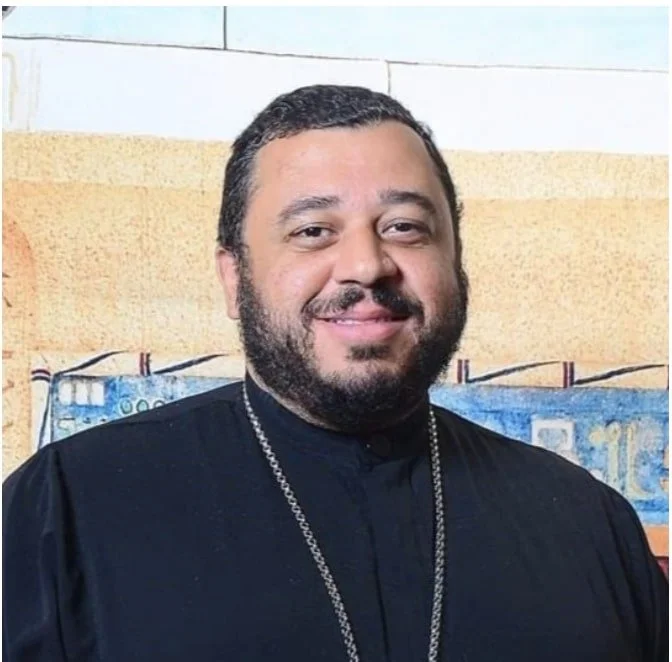Philadelphia’s Coptic Community Celebrates the Feast of the Epiphany
Mohammed Saleh
For most Christian Philadelphians, Christmas is a fading memory, but tonight, January 19, Philadelphia’s Coptic Christians are slated to celebrate the Feast of the Epiphany and officially close out the Christmas season. Many of the estimated 500 Coptic families living in the greater Philadelphia region will attend tonight’s evening mass at St. George Coptic Orthodox Church in Norristown, PA, where there will be a special water blessing prayer and liturgy followed by an anointing ritual.
“Overall it's a joyous season,” said Father Mina Shaheid, a priest at the church, in an interview with Al-Bustan. Established in 1969, St. George Coptic Orthodox Church serves as the oldest Coptic institution in the Philadelphia area, and the fourth oldest in the U.S.
The interior of St. George Coptic Orthodox Church in Norristown, PA.
Philadelphia’s Coptic community is largely comprised of Egyptian Americans who follow the Coptic Orthodox Church, which emerged in Egypt around 50 AD and is one of the oldest Christian denominations worldwide.
A holiday that marks Jesus' baptism, the Feast of the Epiphany is one of seven ‘great feasts’ celebrated annually by the Coptic Orthodox Church. In Arabic, it’s called Eid al Ghutass, which directly translates to “Feast of Immersion.” During the holiday, it’s customary for Copts to consume fresh sugar cane and oranges. Additionally, Copts cook a taro root stew, known in Arabic as kolkas. To prepare these dishes one must peel off an outer layer, which according to Father Shaheid, “is representative of the baptism process.”
Unlike most Western Christians who celebrate Christmas on December 25, Copts celebrate Orthodox Christmas on January 7, along with 12 percent of the world’s Christians who observe the Orthodox calendar.
Typically, Copts begin Christmas preparations during the preceding month, which is called Kiahk. Every Saturday during Kiahk, St. George Coptic Orthodox Church hosted services, during which worshipers sang praises followed by a midnight mass. The liturgy is in English, Arabic, and Coptic, an ancient Egyptian language.
On January 6, many Philadelphia Copts attended evening mass at St. George Coptic Orthodox Church before gathering for Christmas dinner with their families. On January 7, the church hosted a Christmas party for the community.
An estimated 15 million Coptic Christians live in Egypt, forming the largest Christian minority of any country in the Arab World. While the majority of Copts live in Egypt, around 2 million live elsewhere, including in the U.S., Canada, Australia, and Europe. There are 264 Coptic churches in the U.S., five of which are located in the greater Philadelphia area.
Father Shaheid, a priest at St. George Coptic Orthodox Church in Norristown. Photo credit: St. George Coptic Orthodox Church.
“It’s been more than 50 years since the establishment of St. George Coptic Orthodox Church in Philadelphia. During that time, there’s been so much growth in the community because of immigration and mixed marriages,” said Father Shaheid, who notes that the main church is located in Norristown, PA, 20 miles outside of Philadelphia, with a second location on 13th Street in South Philly, and a third location, Prince of Peace Chapel, being built in Plymouth Meeting, PA.
“The church not only serves religious and spiritual purposes, but also plays a huge social role in the community,” said Father Shaheid, noting that it provides social services, educational activities for children, and support for Coptic immigrants. “The church is trying to help its members with every aspect of their life,” said Father Shaheid. Born and raised in Brooklyn, New York, Father Shaheid is an Egyptian American who was ordained in 2009 by the Archdiocese of North America.
Philadelphia’s Copts are one of many Arab Christian communities in the city. The Arab Christian presence in the city dates back to 1865 when a small group of Lebanese Maronites first immigrated to Philadelphia. The first wave of Arab immigration to the United States took place between 1880-1940 when many Palestinian, Lebanese, and Syrian Christians came to live and work in many American cities, including Philadelphia.
***
Mohammed Saleh is a an Al-Bustan Media Fellow, and a Palestinian living in Philadelphia. He holds a BA from Swarthmore College, where he studied Economics and History.


